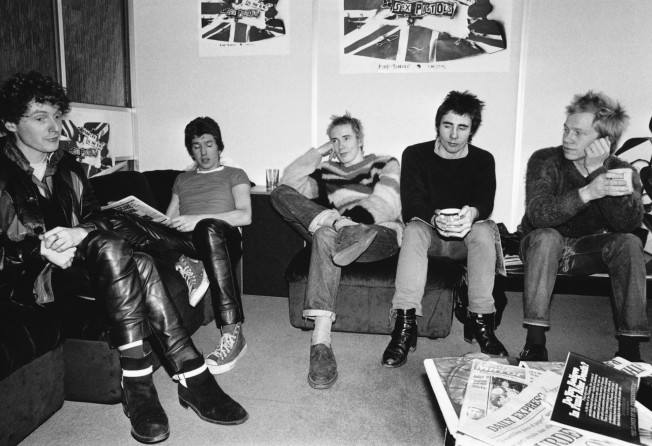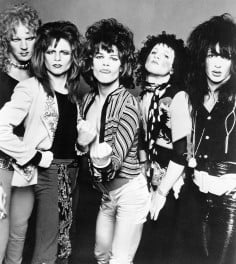Former Sex Pistol shoots from the hip
Glen Matlock, an original Sex Pistol, enjoys his live acoustic shows with former New York Doll Sylvain Sylvain, writes Scott Mervis

It's not the easiest sell in 2014: solo acoustic versions of God Save the Queen and Pretty Vacant sung by any Sex Pistol, let alone one who is not named Johnny Rotten.
Glen Matlock wasn't even around for the recording of the Sex Pistols' sole album, Never Mind the Bollocks, having been replaced in early 1977 by Sid Vicious, but the bassist was with the Pistols in the band's formative years and played a big role in writing the songs on that one record.
He's now on a "Punk Goes Acoustic Tour" with Sylvain Sylvain of the New York Dolls, making that a double bill of un-frontmen.
"We have been mates for some time," Matlock says. "This is the second time we've done a tour like this together. We're in similar boats: known to be sidemen a little bit, but we're also songwriters, and it's a good way of getting our stuff across."
Matlock was an art student working at Malcolm McLaren's London store Too Fast To Live, Too Young To Die (later known as Sex) when he was recruited to play in The Strand with guitarist Steve Jones and drummer Paul Cook. With the addition of snarling frontman John Lydon (Rotten) in 1975 and their rebranding as the Sex Pistols, McLaren's creation became the trailblazers of British punk - a scene heavily influenced by bands such as the Dolls and the Stooges.

"The Pistols were hip to the Dolls and the Stooges and things like that, and the New York punk scene, although we hadn't heard it at the time because no one had made any records. It seemed to be filling both sides of the Atlantic at the same time. When the Ramones first came to England, the Pistols all went and we were quite shocked that they were on the same page as us without us hearing them or them hearing us.
"It was kind of funny. I think everybody got fed up with the same old influences and took a step further back," Matlock recalls.
It was a step away from the Pink Floyds and Led Zeppelins of the world, back to the raw sound of early rock'n'roll. "There's a lot of Eddie Cochran in the Pistols' stuff and the Dolls' stuff and the Ramones' stuff," Matlock says.
"It's that little three-minute, 30-second vignette of what's going on in teenage life with a good beat and a good riff and a good tune. That's what the best rock was to me. What was going on prior to punk with all the prog-rock bands and operas and stadium rock, that was all very remote from what we were trying to do or what was affecting our lives.

The Pistols debuted in February 1976 and by July were joined by The Clash and The Damned. The Pistols' revolutionary first single Anarchy in the UK dropped in late November, followed in December by the riotous "Anarchy Tour". Matlock says they were just reacting to rancid conditions around them,
"London was a complete dump in the mid-1970s and [workers] were on strike all the time, there was rubbish piled high in the streets. There was a real air of despondency, and the song God Save the Queen originally was called No Future. And it really seemed like there was no future. But we weren't celebrating that fact. We were trying to point out that you don't let the wool be pulled over your eyes, you do something about it for yourself."
The bassist says that what rallied the scene was the infamous, expletive-filled TV interview the band did with host Bill Grundy in December 1976.
"It turned us into public enemy No1, and the next day everything changed. All these bands popped out of the woodwork almost overnight because they were looking for something. Everybody always knows what they don't want, but they don't necessarily know what they want until it's put in front of them, and we were put in front of them in a big way."
In February 1977, Matlock was replaced by Vicious, who couldn't really play but looked more the part of an evil twin for Rotten. Matlock, who says the band's dealings then were "so intense" that he was glad to leave, went on to form the Rich Kids (1977-79) with Midge Ure, among other bands, along with being a hired gun for Vicious White Kids (led by Vicious for all of one show) and the Faces reunion (2010).
Matlock has been back as the Pistols' bassist for reunion tours between 1996 and 2008.
His most recent album was 2010's Born Running with the Philistines, but he has been doing these acoustic shows for about 15 years. "A Pistols song against a Rich Kids song against something I'm doing now - they all hang together because it was written on an acoustic guitar and they have my same kind of sensibility all the way through."
What does Rotten have to say about the Pistols bassist playing acoustic versions? "I haven't spoken to Johnny for years and I'm not that interested in what he thinks," Matlock says. "Good luck to him in what he does and hope he thinks the same of me. He'll probably moan, because he's a moaning kind of bloke, but I'm not really interested in what he has to say."
As for the Sex Pistols' decision to shun their Rock and Roll Hall of Fame induction in 2006, he wasn't on board. "I think it was a unilateral decision by Johnny Rotten, and I don't agree with it. What got me is, we turned that one down and then about two weeks later there was an English one he … accepted, so draw your own conclusions from that."
McClatchy-Tribune